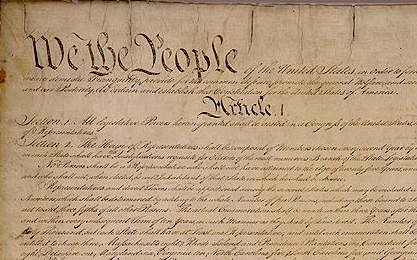We The People: Our Constitution and Its Continued Relevance
Our Founding Documents are as alive as we are

September 17, 2019
“We the People of the United States, in Order to form a more perfect Union, establish Justice, insure domestic Tranquility, provide for the common defence, promote the general Welfare, and secure the Blessings of Liberty to ourselves and our Posterity, do ordain and establish this Constitution for the United States of America.”
This is the preamble to the Constitution of the United States of America. These 50-odd words, and the sections that follow, have defined the United States to this day. Without the current Constitution, the United States would only be remembered as a failed experiment in democracy. At the time the Constitution was written 232 years ago, the United States as we know it was going to collapse. The original constitution, the Articles of Confederation, was far too weak. States had all the power, and the national Congress was more akin to the United Nations of today.
The national government couldn’t:
- tax
- make a national currency
- regulate trade
- enforce laws
Basically, we had a government that couldn’t govern.
So when the Constitutional Convention met in 1787, their intention was to fix the Articles. But they soon found out that they couldn’t fix something that broken. So, they started from the ground up, building the framework for the government we know today.
Compromises between the states had to be made. The debate between whether to have our representation in Congress be equal for every state or based on a state’s population led to the two Houses we have today: the House of Representatives, where every state is allotted a specific number of representatives based on the amount of citizens they have, and the Senate, which has two senators from each state.
But when this document was signed, it was far from perfect. Hence why there were amendments passed and ratified. Ten of these became the Bill of Rights, and there are currently twenty-seven in affect. Two of these are what I believe to be the most important of all: The First and the Fourteenth Amendments.
The First Amendment is quite simple:
“Congress shall make no law respecting an establishment of religion, or prohibiting the free exercise thereof; or abridging the freedom of speech, or of the press; or the right of the people peaceably to assemble, and to petition the Government for a redress of grievances.”
This Amendment allows me to be writing to you all right now. With no first amendment, we couldn’t criticize the government. We might not be able to practice the religion we choose. We might not be able to push boundaries with art. The press, like the news site you’re reading right now, would have to be filtered by the government. But make no mistake: this amendment simply bans the government from censoring you. Hence why you can, and should, get in trouble for saying hateful things.
The Fourteenth Amendment is a little longer, and a little more complicated, but I believe the first section summarizes it quite well:
“All persons born or naturalized in the United States and subject to the jurisdiction thereof, are citizens of the United States and of the State wherein they reside. No State shall make or enforce any law which shall abridge the privileges or immunities of citizens of the United States; nor shall any State deprive any person of life, liberty, or property, without due process of law; nor deny to any person within its jurisdiction the equal protection of the laws.”
Under this amendment, passed after the Civil War, we are all equal citizens under the law. Man or woman, black or white, we are all citizens and we are all entitled to those poetic words of the Declaration of Independence: Life, Liberty, and the Pursuit of Happiness. This amendment has been violated time and time again to be sure, but the words are there. And they will remain there, waiting for us to look back and call upon them in our time of need.
That goes the same for every other amendment and article of the Constitution. See, our Constitution is more than ink on a piece of parchment. It lives and breathes and changes with our country. Perhaps one day, we will need a new Constitution. But until then, those dusty pieces of parchment have enough life in them to faithfully continue to serve “We the People” for a long time.




